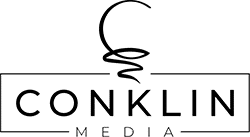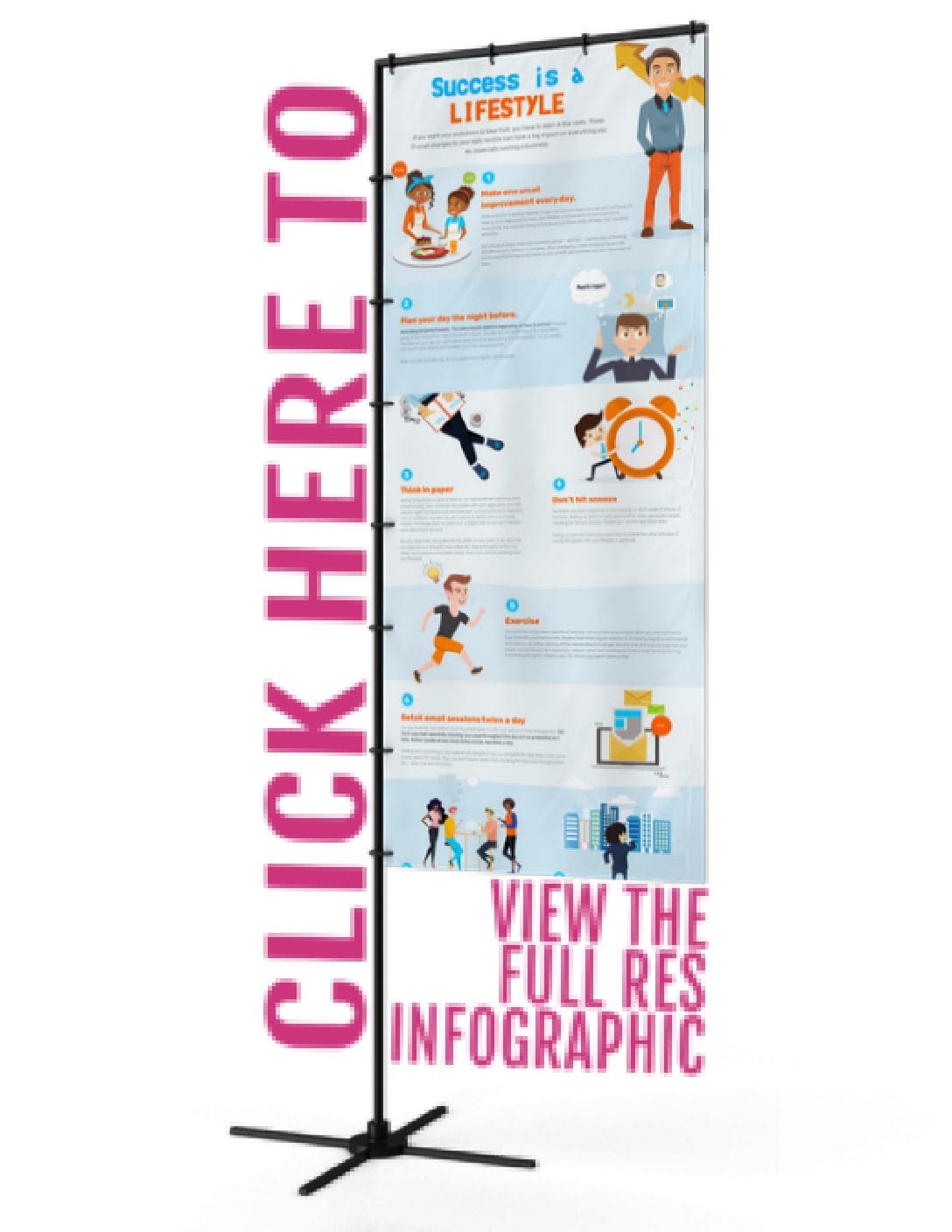
Do you strive to be successful? Everyone has their own interpretation of what success is but, it is the foundation that remains unchanged.
It is the decisions made throughout the day the propel you forward or hold you back. This is done by design whether you want to accept this truth or not, humans are creatures of habit.
Luckily, you have the ability to develop these habits. What habits should you develop though? We’ve compiled some of the key components from highly successful individuals in the world.
Below are their thoughts on specific factors of which they can attribute much of their success. Be sure to check out our infographic for a better look into the specifics.
If you want to achieve a higher level of success in life, you need to be intentional–it’s not just going to happen. Start by taking advice from more than two dozen executives who credit simple daily routines for helping them rise to the top.
Look For Ways to be 1% Better Everyday.
“The key to building a better business or becoming a better version of yourself rests in making small, continuous improvements every single day. Instead of incorporating drastic changes in a short amount of time, focus on making something 1 percent better from the day before. That’s it, just 1 percent. It doesn’t sound like much, but those small improvements will start compounding, and that will gradually lead to the change you want. In time, you will start to see improvements in your business and in your life, and all it takes is a commitment to become just a little bit better every day.”
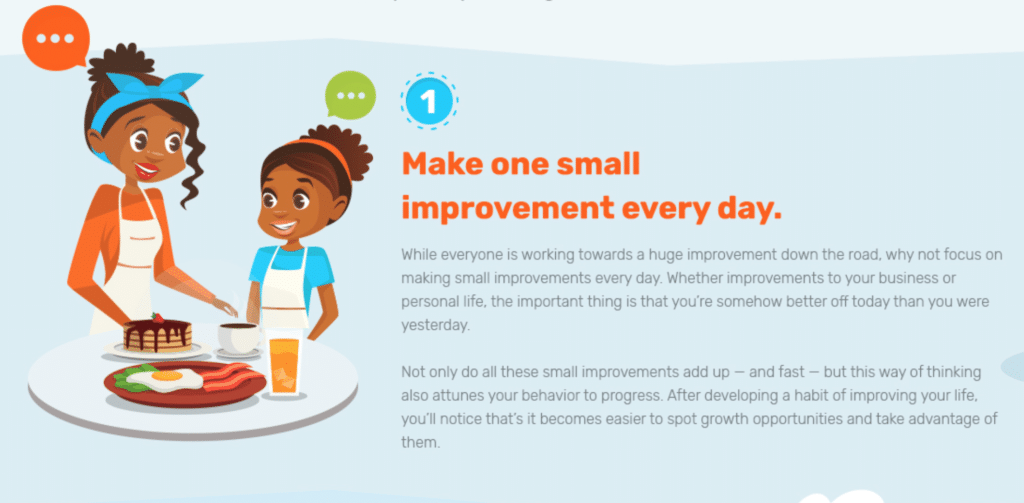
The little things add up. Take if from Matthew Eichhorst, it is a continuous process that compounds the longer you work at it. These small improvements are much easier to maintain to form a habit when compared to drastic changes overnight.
Start Your Day With What Matters Most.
“I have made it a daily practice to eat breakfast with my son. Landon and I wake up early each weekday to cook and eat breakfast together. This time together has become a favorite way to connect daily. Sometimes my son won’t stop talking. Sometimes we eat in silence. Sometimes we argue. Sometimes I set off the smoke alarm. No matter the drama, I cherish this daily ritual. This high-quality interaction grounds me to what matters most in my life, helps me snack less, and supports better decision making throughout my day by keeping my family front and center in my mind. [Also,] don’t let road trips stop you–Facetime can help keep your commitment alive and well.”

Yes, planning is essential to success. It is vital to determine your goals and priorities for tomorrow each night. This becomes increasingly important as tasks and projects grow in complexity and numbers. This nightly planning will help to lower your stress and ultimately prevent overwhelm through increased clarity and focus.
Plan Tomorrow Before Going to Bed Tonight.
“Take the time at the end of the day to assimilate everything that happened that day, wrap up loose ends and have a clear game plan for the next day. This helps me sleep better and wake up ready to tackle the day right away. I was influenced early on by Stephen Covey’s classic ‘The 7 Habits of Highly Effective People’ and per his advice, I try to have goals and daily plans for all my roles–at work, in the community and in my personal life.”
Keep a Handwritten To-Do List.
“I’m sure lots of people do this, but I review and prioritize it daily, marking which items were important and in what order depending on time sensitivity. I have decided not to digitize my to-do list because the process of writing my list helped me think through each item’s relative importance and also committed them to memory. Having a physical notebook also allows me to review and adjust it anytime I’m waiting at an appointment or in between meetings easily. As I complete items, I get the satisfaction of crossing them out and seeing what had been accomplished. When there are more things to add or too many items crossed out, I rip out the old page and rewrite my to-list every few days, when I again assess the priority of the items I’m writing. If it’s been a few weeks or months when I see the same items, I drop them from the list because they clearly weren’t important enough relative to everything else. This habit helps keep me focused on what is truly needed for both short-term and long-term tasks and keeps me disciplined on ensuring items that don’t get my attention get handled another way or removed as a distraction.”
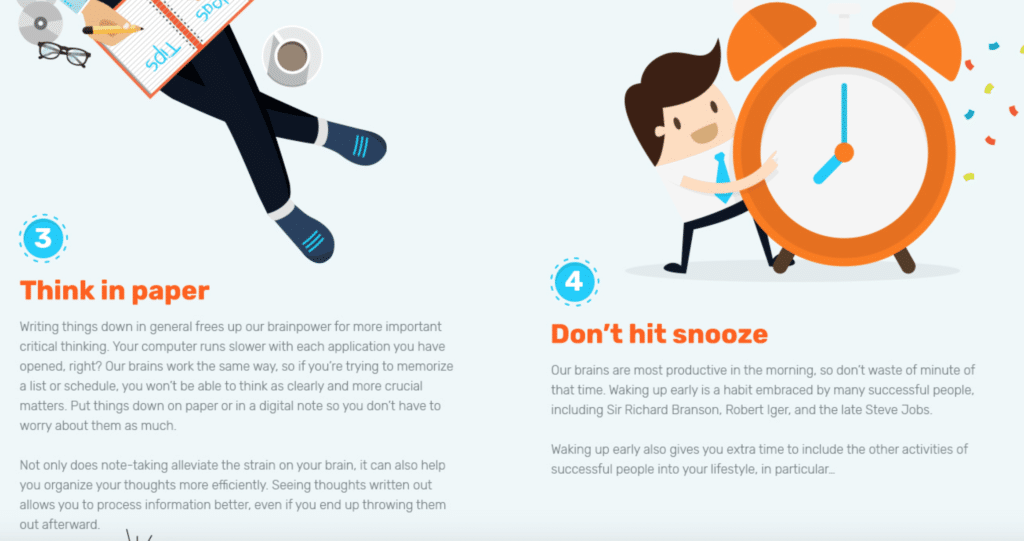
Nothing beats handwritten notes. The mind is more likely to retain information when written by hand in addition to decluttering you brain. By writing things down you process information differently especially when writing by hand.
Speaking of processing information differently… Stop hitting the snooze! That early morning wake up call is to jumpstart your productivity. The more you hit snooze, the more time you waste in a groggy state each morning, not to mention you become programmed to ignore the first, second, third round of the alarm.
Run and Work Your Brain.
“I start each morning with a run. Running activates a specific mindset and connects ideas in a sequential flow. It helps me dial in and focus my thoughts. You can’t establish this mentality in the office. Sitting at a desk with a pen and paper pad can only provide you with so much clarity. I’ve found that journaling a stream of unrelated thoughts does not aid problem-solving efforts. My best advice: run to uncover the best solution.”
Commit to 30 Minutes of Exercise a Day, No Excuses!
“Whether it is in the morning to energize my day or at night to clear my head, I rely on this time as a mental reset. If I feel the need to jump start my day, a 30-minute workout gives me a feeling of accomplishment and puts me on the road to a productive day. If I need to reset my brain at the end of busy day a 30-minute walk or run allows me to relax my brain and think clearly on what I need to accomplish. I am a firm believer that the body fuels the mind.”
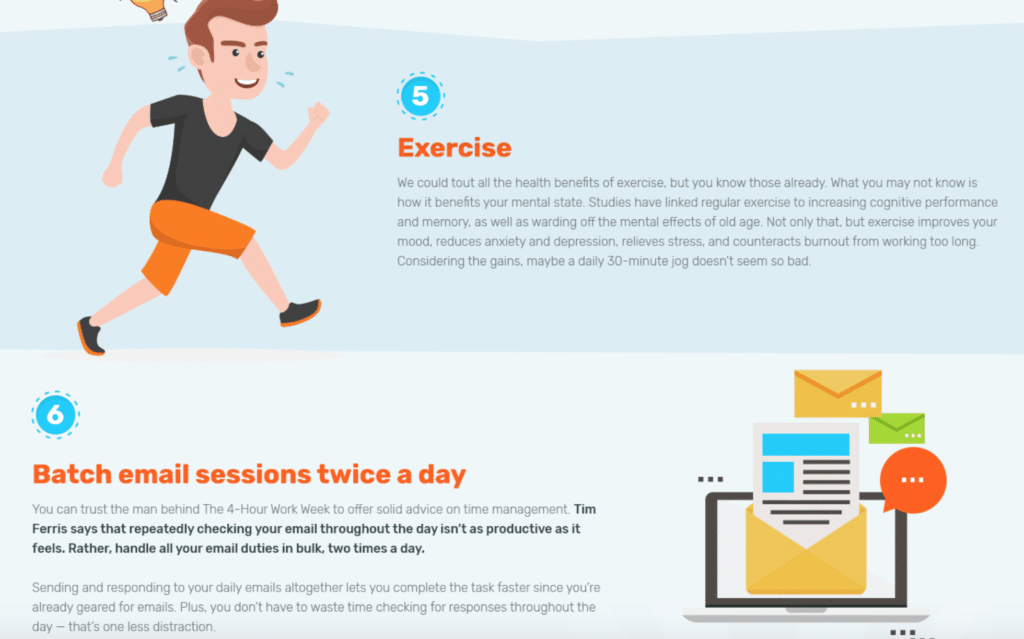
It comes down to productivity. Exercise has not only proven to increase your health but your energy, blood flow, and overall cognitive performance. This is why most successful people ensure to get the blood pumping each and every day, the 30 minutes is worth it for the extra focus and energy throughout the day.
This ultimately helps eliminate distractions, like batching your emails being received and when you reply. This is effective because others will adapt to your response windows and will handle events with differing senses of urgency. It streamlines skimming emails and creates a set priority list as you sift through them emails. You can block out more than just email time.
Minimize Distractions.
“Start your day by setting clear priorities for yourself and then make a conscientious effort to minimize distractions. With leadership comes immense responsibility where the stress of not having enough hours in the day can become burdensome. With a few productivity hacks you can get creative to minimize distractions and maximize production. Limit the amount of small talk and conversations about current affairs, only check your email twice a day during scheduled times, screen your calls, and don’t be in a response mode all the time. Minor adjustments can help enhance your overall efficiency and benefit the entire team.”
Block Out Time For Your Best Thinking.
“Figure out what part of the day you are the most productive and block that time out for important work. During your less productive hours, you can use that time to read and respond to operational work and status reports. For me, my most productive hours are 7 a.m. to 10 a.m., so I often defensively schedule that time to work on tasks that require a high degree of concentration and do my best to ignore interruptions like emails and phone calls. I then spend mid-afternoon and my train-ride home on items that require attention or awareness on my part, but not my best thinking.”
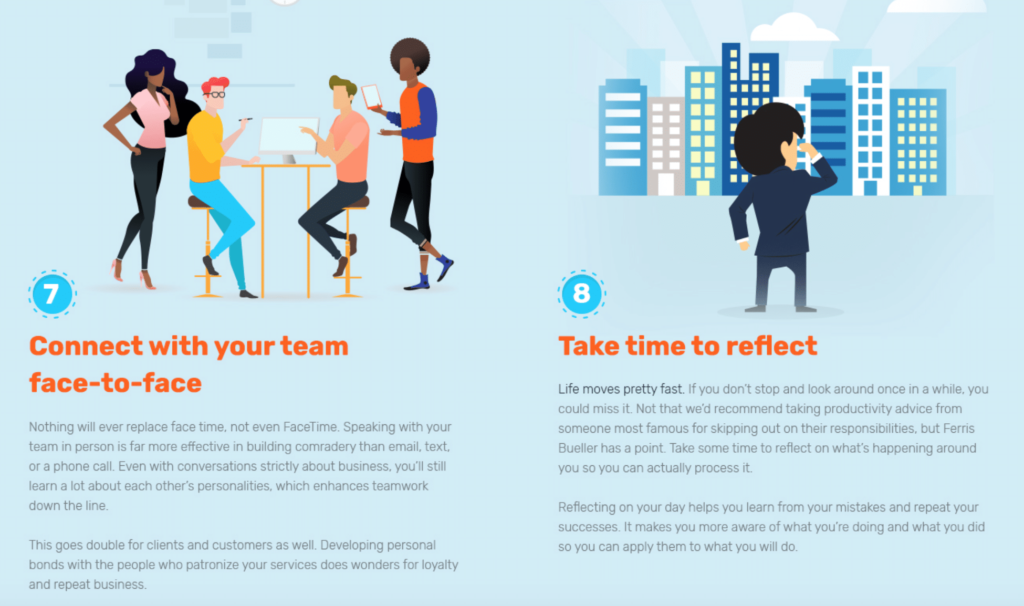
Interact with your team, build real friendships and teamwork. It isn’t just about sending quick messages to get things accomplished. Make the effort to walk and talk to the person about the task at hand, you can read a lot more about how someone feels about a project when you talk to them in person as opposed to email, skype, slack, etc.
These face to face interactions also create a few things for you to think about. It is important to take time to reflect. It doesn’t have to be about you team or business but through reflecting you will discover areas for improvement be it aspects of projects that could be completed better or how you interact with your team.
Make Face-to-Face Connections.
“Always keep some time open on your calendar to connect with your team face to face. In my day-to-day, it is so easy to fill up every minute of my calendar given all the requests for my time. I think this is true for most executives. But I always keep a couple of open blocks to make sure I can respond quickly to items that need my attention on short notice. Those are also the times I use to recharge, connect with customers, or just walk around the office. I get a lot of energy from face-to-face engagement with our employees. There is a lot you can learn through ad-hoc check-ins that might not be revealed in scheduled meetings.”
Take Five Minutes to Reflect and Build Your Mental Muscles.
“Every evening, I reflect for five minutes before falling asleep. In my role, every day is busy but also completely different from the last. It’s important I take a step back and reflect on what was accomplished, what I learned from those new experiences, and what I can improve on next time. I encourage my team to do the same and take stock of what they were proud of that day or what they think could have gone better. Most importantly, this ritual is a chance to consider what we can do tomorrow to be a better person to others. Committing to this practice every day builds the muscle of calmness and gratefulness that positively impacts both your professional and personal lives.”
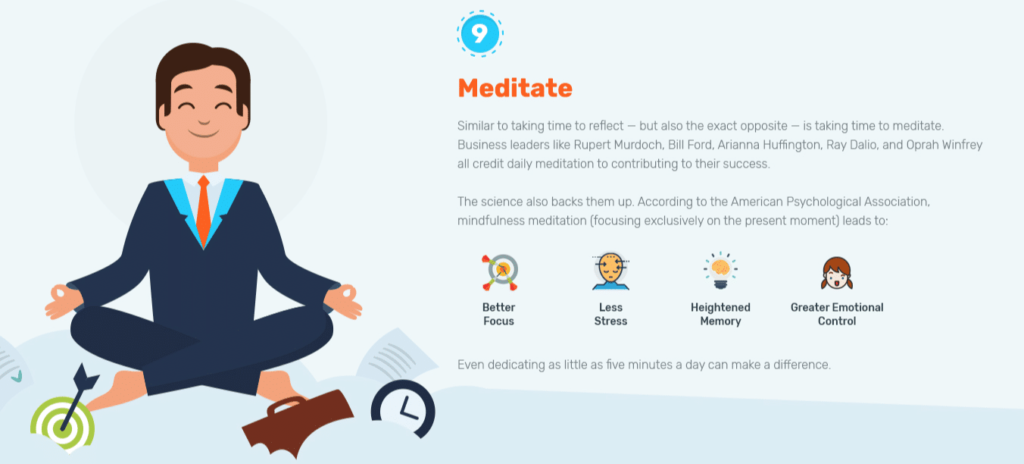
Not only does reflecting help you to process your day and responsibilities but if you take the time to fully meditate you will unlock additional benefits. First, it increases focus and lowers stress, even just 5 minutes is proven to have lasting benefits for your day.
Leave Your Ego At The Door.
“[My routine] starts with getting a good night’s sleep, seven to eight hours. I get up, work out for 15 minutes, meditate for 15 minutes, have a light, high-protein breakfast or smoothie, then go. This sets me up to come to work clear-minded and ready to support my teammates in our collective mission of alleviating suffering. When I get to my clinic, I leave my ego at the door. My central contribution to the achievement of our mission is not being too concerned about who gets the credit for our success. I want my teammates to shine. I offer support in all the ways that I can think of, and I ask for what support they would like. We support one another in identifying and letting go of whatever may get in the way of optimum performance. At the end of the day, we know we can accomplish anything with integrity and clear, honest communication.”
Start Your Day Alone Without Distractions.
“It seems selfish but you have to start the day solo without distractions, meetings or phone calls which means the first couple hours of your day are all about you. This allows you to tackle key items that unlock accomplishment and opportunity for you and your team, as well as maximize what is usually the most potent decision-making time of the day–the morning. This allows you to guide the day, rather than it being taken over by random distractions. It’s all about focus.”

The most successful people in the world do not know everything. However, they never stop learning. Reading is a great way to relax and increase your processing power and the retention of information.
Feed Your Curiosity.
“Set aside some of your prime work time every day to read and learn about anything that interests you. Innovation comes from making connections other people don’t see. Some of Leonardo da Vinci’s artistic genius was the result of his study of anatomy, mechanics, and engineering–fields that aren’t often linked to art. I couldn’t have predicted how useful my background in cognitive psychology and behaviorism would be in my current work creating learning software, but almost anything I read can lead me to a new way of thinking about our business. Whether it’s books about presenting, negotiating, making war, influencing, statistics, language, history, or anything else, there’s something there to learn about how to work differently and make connections other people don’t see.”
Stay Current on News, Trends and Tech Developments.
“Every day for the last four decades, I’ve spent at least an hour scanning articles, ads, announcements, papers and videos, looking for new developments and improvements in hardware, software, algorithms, capacity, capability, and user experience. Getting in early on trends and new developments, in order take advantage of important technology changes, is a big part of entrepreneurial success. Advances in capacity, capability and speed, combined with rapidly improving economics, fuel my passion for building new products and companies.”
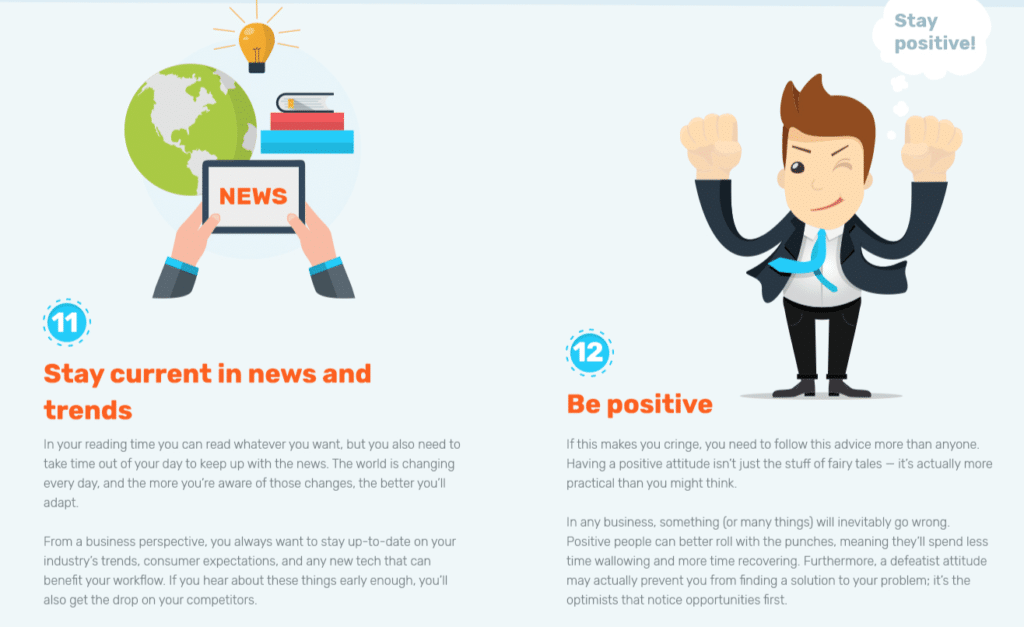
Stay up to speed with the news, at least in your industry and popular trends currently holding the population’s attention. Being in the know is a great way to discover opportunities and potential obstacles.
Despite news being skewed toward more depressing events, it is of the utmost importance to remain positive. A positive mindset and outlook creates a positive presence that others want to be around. This will also draw opportunities your way because you see solutions and not problems.
Be a Positive Presence.
“Smile, say hello, and generally be a happy, friendly face. We’re all busy, stressed and focused on the task at hand. When it comes to making the most of meetings, I like to ensure my colleagues feel valued. I try to understand what they need, seek to be helpful, and, at all times, thank people for their time and effort. We always have enough time to say thank you. Remember that while we are all working hard, we’re all people. If in the course of a busy day someone needs a quick answer, or is stuck, making just five minutes of time can help another save hours. The gift of one person’s time can in turn help others give the gift of their time. So, take a moment and pay it forward.”
Keep Your Friends Close and Your Pets Closer.
“The day-to-day of an office can be stressful and taxing. One way I combat that is by bringing my [dog] with me to work each day. Studies have shown that hosting your furry friends in the work space, reduces stress levels and creates a more positive environment. Your company’s perception is also boosted, softening its image and presenting as progressive, lively and forward-thinking. While business is serious, I feel sorry for those who don’t get to have fun at work.”
Address Issues As They Happen.
“I always believe that it is best to deal with problems as they occur and not procrastinate through avoidance. An example would be issues that need to be corrected with team members. Deal with them professionally and rationally as they occur, use them as a learning experience and never surprise a team member in a quarterly or annual review. If there is a performance issue, it should have already been dealt with so that costly mistakes are not repeated.”
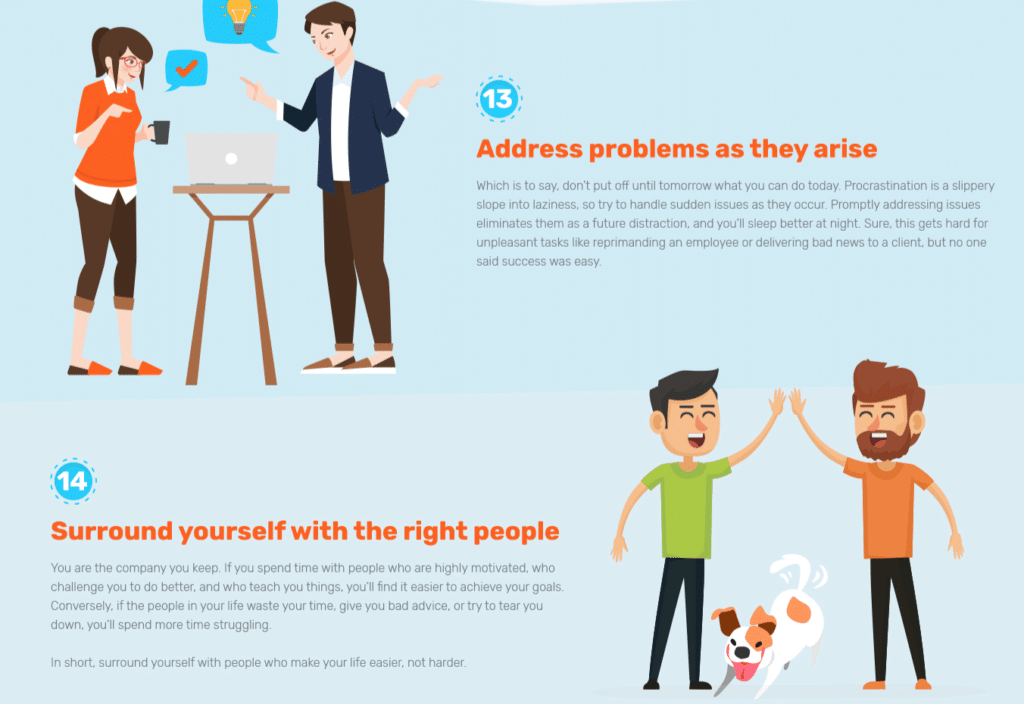
When you run into a problem, believe us, everyone runs into problems, it is best to address it when it appears. The first reason to do this is because it eliminates the stress for all parties as quickly as possibly. It also helps to prevent procrastination from becoming a habit.
By surrounding yourself with positive people and great fits for your team, these problems can be squashed quickly and painlessly. Supportive team members, friends and family are one of the biggest elements to success. You are but the product of the 5 people you spend the most time with.
Leverage the Knowledge of Your Team.
“To harness a diverse set of viewpoints and ideas, I always seek the input of employees to develop new initiatives or solve an issue. No matter what level an employee is at, listen to their ideas and ask for their opinion–their knowledge is our company’s most valuable asset. Hearing fresh perspectives and a variety of inputs is a great way to combat having a stale brand and leads to success in innovation and finding cutting-edge solutions. This also shows employees that they have a voice that is heard and matters, which elevates morale and gives them a true purpose within the workplace.”
Use Psychological Strength to Succeed.
“Every day, I try my best to use psychological strength in order to succeed at my profession. This includes being tenacious, having a clear vision, identifying a niche and going all-in on an opportunity, creating a warm, family-like work atmosphere, eliminating negative self-talk, and always seeking that next challenge. I was fortunate to be raised by parents who made sure I understood that I was capable and intelligent enough to do anything I wanted, if I only put my mind to it. I always try and keep this in mind whenever I’m faced with a professional obstacle, whether that be trying to improve the business through marketing, new procedures, or restructuring and optimizing the flow systems of patient care.”
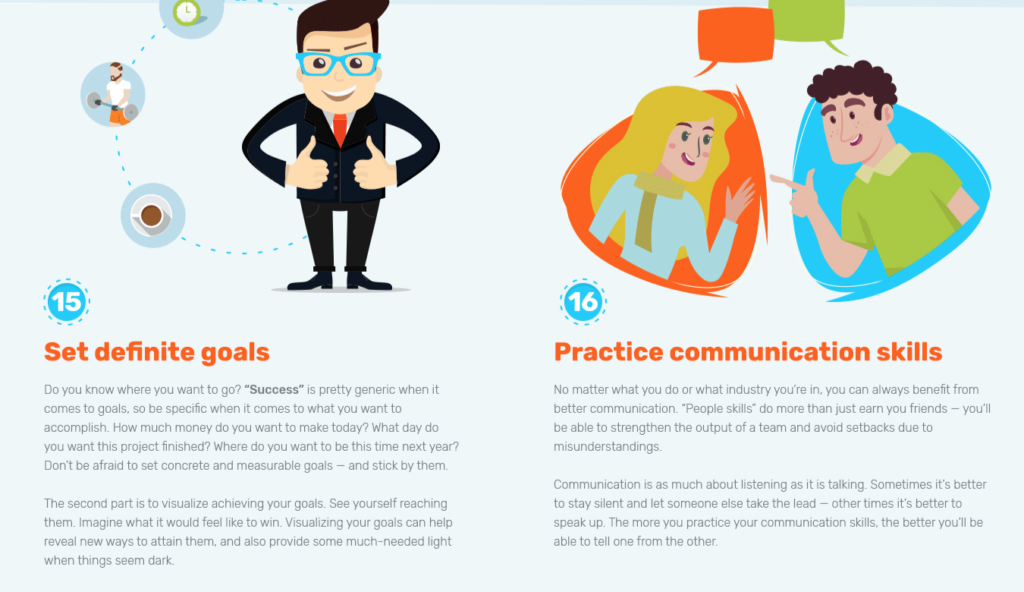
Having the right support will help you achieve your wildest dreams. So dream big, set definitive goals so you know exactly where you are headed and what you are striving for. Generic and broad goals are not doing you any favors, instead they could be holding you back because you could be aiming higher.
This is where communication comes in handy. Let’s raise our revenues versus Let’s triple our monthly revenue by September is a big difference. Communication is key, not just with goal setting but with clients and team members as well. Solid communication can create opportunities and solutions you’ve been looking for.
Juggle Your Business and Personal Priorities.
“To be successful in our always on-society, I advocate integrating work and life to ensure you are meeting your employer’s expectations as well as those from your family. My career (I love where I work and what I do) and my family (my wife and children are core to my success) are all very important to me. As a leader in the office and at home, this means that I may need to manage a personal matter in the middle of the day or navigate business-related activities in the evening. To make it all happen, I use my calendar extensively to prioritize commitments. As long as I don’t miss deadlines or important events–whether its quarterly company reporting or attending my son’s basketball game–I’m able to perform at my very best. This flexible approach to juggling business and personal priorities has been key to my success.”
Recognize Important Moments in the Lives of Employees.
“Whether someone has a loved one who is sick or passed away, had a child graduate from high school or college, is celebrating the birth of a child or grandchild, or is getting married or remarried, I try to write a short personal handwritten note recognizing and expressing my sentiments–hopefully congratulations but sometimes sorrow and condolences–about what’s going on in their lives. I certainly don’t do this every day, but you need to have an everyday mindset about this if you are genuinely committed to it and if you want it to become part of your management style. As much as monetary recognition is meaningful to people, these personal notes are also very meaningful and greatly appreciated, and I think this has helped us develop the caring culture we have in our organization today.”
Only Eat Twice a Day.
“The fewer small decisions I have to make, the more mental space I have for my business. This is why I eat the same thing for breakfast every morning at the same time. Instead of stressing daily about what to eat, I know exactly how my mornings will go because that decision has already been made. It’s one more thing off my busy plate. As an entrepreneur, I look for ways to systematize and optimize everything I do. Furthermore, when it comes to food, I only eat twice a day–in the mornings and evenings. Digestion takes energy, and the less energy I allocate to digestion the more mental energy I have for the rest of my day at work.”
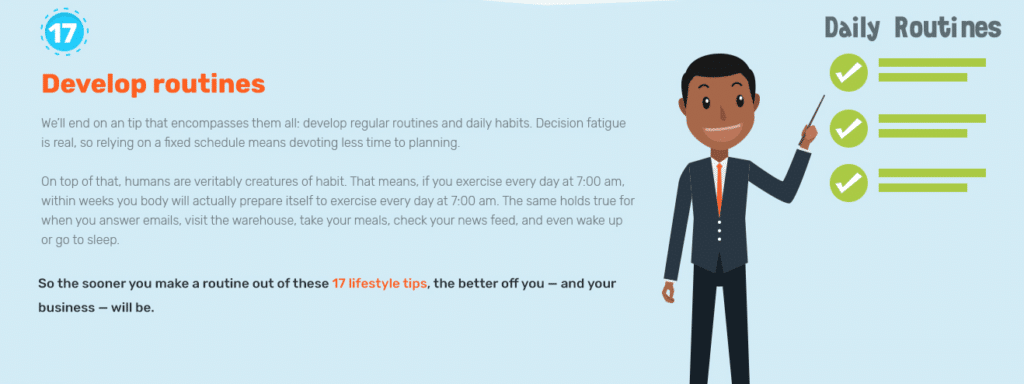
Are you currently saying to yourself, “this is great stuff, but how am I going to do all of this every day?” It’s easy once you have a routine developed. Common for most of the successful people in the world are routines and standard operating procedures. By following a routine you develop a habit and with the right habits and routines in place success becomes inevitable so make sure you design success into your routine.
Record Your Top 3 Important Tasks of the Day.
“Many of us have commutes that take our thoughts in different directions, but sometimes we fail to capture or remember them. I find the early morning commute to be the best time to capture my most important to-dos for the day. When a business thought or task crosses my mind, I immediately record it no matter how trivial that it may be. Once I get to the office, I prioritize my most important to-dos into a top three and I do not leave until they are accomplished. Some of the bigger ideas go into another list that I work on as time allows.”
Begin the Day With a Specific Purpose.
“I’ve found that being busy all day doesn’t necessarily equate to getting things done. It’s easy to get caught up in the fire drills, meetings, and typical busy work that rule our professional lives, but the drawback is that at the end of the day, rather than feeling accomplished, we end up just feeling exhausted–and maybe a little frustrated that our to-do list went unchecked–again. Something I try to do every morning is begin the day with a specific purpose. When I have a clear vision of what I want to accomplish, I’m more likely to be able to cross at least one item off my list at the end of the day. And chances are good that I’ll stay on track with other priorities, as well. One of Stephen Covey’s seven habits is to ‘begin with the end in mind.’ That’s great advice for anyone who wants to remain focused despite daily obstacles.”
Take Care of Yourself!
“It’s not easy being a surgeon, as each day carries its different challenges. But having an amazing team filled with talented and effective individuals and making sure I take the time to take care of myself–these are the things that have led to my success. Maintaining a daily routine helps me balance my life. I wake up and go bed at decent hours, minimizing overall stress and the potential to overwork. I start my day off with a glass of grape juice, fruits and coffee, which give me the energy I need to stay alert throughout the day. On days I don’t have surgery, I’m training with my personal trainer at 5 a.m. before heading to the clinic. I work out three to five times per week, focusing on cardio, hot Pilates and weights (I always preach core training to my patients). Sometimes after work I attend business meetings, network, and spend time with my daughter, helping her with homework. While I’m always thinking of ways to keep myself as sharp as possible, I also recognize the importance of downtime, decompressing, and reflecting on all that I have already accomplished. Keeping a work-life balance can be difficult, but having a healthy mind and body makes it much easier. It has also undoubtedly made me more successful.”
Final Thoughts
We hope you found some gems of inspiration in here. Remember all of these individuals were not always super successful. Yet, success is not has hard as many make it out to be. What it really comes down to are these few items:
- Routine
- Focus
- Health
- People
Learning what works best for you takes a little bit of time and your routine will change. The cool thing is, it’s a lifestyle you can gradually create 1% each day until you are crushing it daily. There are always room for improvements and you don’t have to figure it out all on your own. Study and model the success habits of highly successful people and skip much of the trial and error stages.
Don’t forget to check out the full infographic as a resource and reminder for a boost in your success lifestyle.



